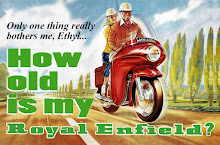 Lawrence Read and the island bridge that led him to buy a Bullet.
Lawrence Read and the island bridge that led him to buy a Bullet.A gentle voice from far away found its way to Royal Enfield forums on the Internet last year. Lawrence Read, an American living on an unhurried island in the South Pacific, began subtly suggesting that Royal Enfield riders slow down and appreciate the path they've taken.
Read writes from the Kingdom of Tonga, a group of islands visited by Captain Cook. They're also called the Friendly Islands because of the welcome Cook received.
A typical Read message is the one entitled "Good Enough" on the Classic Motorworks Community Forum:
"Let me put a short log on the fire and give you a little of my view of life in general and RE in particular," he begins. He weaves a tale of island life with his Tongan wife Malia. She declines to upgrade the ceiling of her house, which she had covered with paper saved from bags of cement.
Cement bags are good enough, she tells him.
"And so we return to the ancient bike called a Royal Enfield -- doesn't really go very fast, is a bit quirky with only a single cylinder and rather low technology. We can fancy it up a little with various modifications but underneath it is the same old lady -- simply put -- it is good enough," Read concludes.
But don't patronize him. Tonga has the usual problems of places associated with Eden, including the high price of imported goods, creeping Westernization and the frustration of getting parts.
"Interesting to me that people find my life here interesting -- one RE forum member called my life 'surreal' -- but to me it is just life as usual. And it has been a long life of 66 years, most of it spent overseas or here in Tonga," Read explains. His philosophy and its relationship to Royal Enfield motorcycling comes through as he tells the story.
"I grew up in Southern California (Riverside), which was a big biking area back then. My first 'bike' was a Powell motor scooter and I recall that even in junior high school many were driving around on Cushmans and such. Nice place to grow up back then, but far too populated now.
"My profession started out as a university lecturer down in New Zealand where I escaped from the highly political environment of academia in the U.S. I was then a zoologist with a Ph.D. from the University of Washington. My specialty was shark biochemistry.
"I also worked in the chemical industry in the U.S. as V.P. of a chemical company, but, again, the stress got to me and I dropped out to work in my garage making wooden specialty items for people on a custom basis. Quite a career change, but I've never really regretted it (except for the lost income!).
"I met my wife while doing a small university project concerned with fishing in the South Pacific. I had caught a small copra boat, intending to come here to Vava'u (Tonga has three main groups of islands, Vava'u is the northern one). But through miscommunication I ended up for a month on my wife's island and met her within minutes of arrival. She was out conducting a field trip for her school students. I was smitten!

"(We) married nearly 27 years ago after a two-year courtship in the traditional Tongan manner of complete chaperonage (frustrating to have all of one's future in-laws always around!). My wife is from a small atoll in the Ha'apai group of Tonga and is quite traditional in her outlook, enjoying pursuits like mat weaving.
"After marriage we moved back to Morro Bay, Calif. and I can well remember the time she entertained ladies from our church by putting out her Tongan finery, like a large decorated mat on the floor. They probably thought her 'quaint'. We have two children and Malia is currently living in the U.S. helping out as backup for our kids as they attend university there.
"After a dozen or so years in the U.S. I saw that while I could very easily live in Tonga, it was a bit difficult for Malia to live in the U.S. without her family around, so we gradually made the move down here. I can say I've never had a regret either in my marriage or in settling here, although life is quite different than it was in the United States.

Lawrence Read's Bayviewtonga apartments on Vava'u.
Internet has eased things quite a lot and it is much easier getting things ordered and sent down. Before …it was almost impossible, so one learned to do without.
"My first real bike was a Royal Enfield twin (an early Indian), which I only owned for a short while in the U.S. When our local bridge looked like it was about to meet its demise through neglect, I saw that I would need cheaper transportation on the longish road around the lagoon and into town. So, I … started looking into Royal Enfield, which I soon found was being manufactured in India.
"The first RE coming used from India wasn't in very good shape cosmetically, so it is becoming the basis for a trike-rickshaw. The second, a 2002 Machismo, was purchased new from the U.S. after a Custom's seizure (I was able to get it cheap!).
"In addition to the two bikes, I have put in a fair supply of spares and enjoy tinkering with them. No RE dealership here! I think I'm the only RE owner in Tonga, and the people here seem to get a kick out of seeing this old man cruise by with a … grin on his face!
"My Enfields' DIY simplicity, low-cost spares, and size (mine are both 350cc AVLs) seem about perfect for here. My island is only about 25 miles north to south and east to west, so even a smaller bike would suffice, but I like having just a bit more size and the torque of a 350. Our roads are narrow and a little rough, but, in general, about perfect for the type of riding REs were designed for.
 "My rickshaw which is gradually taking shape is almost entirely of wood -- light, strong and corrosion free -- but. like most of my projects, is only, design-wise, in my mind, with a few rough sketches on paper. I like to work this way because I'm prone to make changes as I go along. The nice thing I am finding is how logical everything is as the rickshaw takes shape… I can then sell my rusty old, gas guzzling SUV and free my life up by that much. Fuel is expensive here and the rate of travel slow (maximum speed limit below 40 mph) so the rickshaw should fit right in.
"My rickshaw which is gradually taking shape is almost entirely of wood -- light, strong and corrosion free -- but. like most of my projects, is only, design-wise, in my mind, with a few rough sketches on paper. I like to work this way because I'm prone to make changes as I go along. The nice thing I am finding is how logical everything is as the rickshaw takes shape… I can then sell my rusty old, gas guzzling SUV and free my life up by that much. Fuel is expensive here and the rate of travel slow (maximum speed limit below 40 mph) so the rickshaw should fit right in."With the bridge out, my small resort apartments
"What I have here was largely built with my own two hands during a nearly 15-year struggle. Life in paradise has been anything but a long rest, but I like that I work for myself and family. I also like getting up each morning and then deciding what to do with the day. Unstructured time, I call it, and the Enfield fits right in!"

Can you identify Lawrence Read's island of Vava'u? Of course not. But try process of elimination. The other three are Oahu, Bermuda and the Isle of Man, in no particular order. They are very roughly shown in the same scale.























Thank you David and Lawrence for this quite interesting view of a life far away.
ReplyDeleteBest Regards, Johann from Germany
The answers to the map quiz:
ReplyDeleteA. Isle of Man
B. Oahu
C. Vava'u
D. Bermuda
Having failed geography in school I was unprepared for how relatively small Oahu is, although it is the largest of these four. Bermuda is shockingly small. How do all the hurricanes manage to find it in that big ocean?!